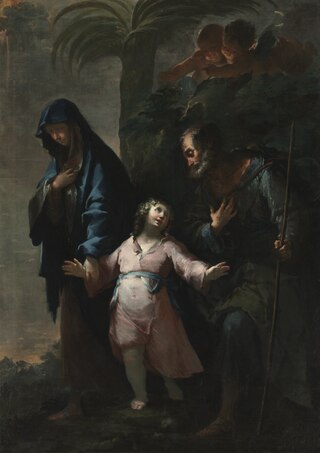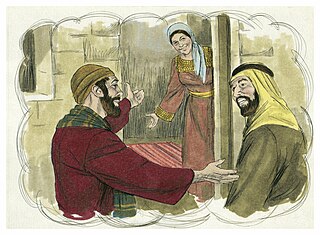Related Research Articles

Matthew 2:2 is the second verse of the second chapter of the Gospel of Matthew in the New Testament. The magi travelling from the east have arrived at the court of King Herod in Jerusalem and in this verse inform him of their purpose.

Matthew 2:12 is the twelfth verse of the second chapter of the Gospel of Matthew in the New Testament. The magi, dispatched by King Herod, have found and paid homage to the Infant Jesus. In this verse this they return home rather than to Herod.

Matthew 2:23 is the twenty-third verse of the second chapter of the Gospel of Matthew in the New Testament. The young Jesus and the Holy Family have just returned from Egypt and in this verse are said to settle in Nazareth. This is the final verse of Matthew's infancy narrative.

Matthew 3:11 is the eleventh verse of the third chapter of the Gospel of Matthew in the New Testament. The verse occurs in the section relating the preachings of John the Baptist. In this verse he predicts that he will be followed by someone much greater than himself. The main theme of this verse is that John will soon be supplanted by a much greater figure and that John's water baptism is just a preparation for the much greater baptism with the Holy Spirit and fire.

Matthew 14 is the fourteenth chapter in the Gospel of Matthew in the New Testament section of the Christian Bible. It continues the narrative about Jesus' ministry in Galilee and recounts the circumstances leading to the death of John the Baptist.
Matthew 12:38 is the 38th verse in the twelfth chapter of the Gospel of Matthew in the New Testament.
Matthew 11:9 is the ninth verse in the eleventh chapter of the Gospel of Matthew in the New Testament.
Matthew 14:3 is the third verse in the fourteenth chapter of the Gospel of Matthew in the New Testament.
Matthew 14:2 is the second verse in the fourteenth chapter of the Gospel of Matthew in the New Testament.
Matthew 14:4 is the fourth verse in the fourteenth chapter of the Gospel of Matthew in the New Testament.

Matthew 10:11 is the eleventh verse in the tenth chapter of the Gospel of Matthew in the New Testament.
Matthew 14:8 is the eighth verse in the fourteenth chapter of the Gospel of Matthew in the New Testament.
Matthew 10:20 is a verse in the ninth chapter of the Gospel of Matthew in the New Testament.

Matthew 10:27 is the 27th verse in the tenth chapter of the Gospel of Matthew in the New Testament.
Matthew 14:13 is the thirteenth verse in the fourteenth chapter of the Gospel of Matthew in the New Testament.
Matthew 14:12 is the twelfth verse in the fourteenth chapter of the Gospel of Matthew in the New Testament. It refers to the death of John the Baptist and the burial of his body.
Matthew 12:19 is the nineteenth verse in the twelfth chapter of the Gospel of Matthew in the New Testament.
Matthew 11:4-6 is a set of verses in the eleventh chapter of the Gospel of Matthew in the New Testament.
Matthew 14:6-7 is a set of verses in the fourteenth chapter of the Gospel of Matthew in the New Testament.
Matthew 14:9-11 are verses in the fourteenth chapter of the Gospel of Matthew in the New Testament.
References
- ↑ Robert Witham, Annotations on the New Testament of Jesus Christ. Dublin: 1730.
- 1 2 3 4 5 "Catena aurea: commentary on the four Gospels, collected out of the works of the Fathers: Volume 6, St. John. Oxford: Parker, 1874. Thomas Aquinas". 1874.
 This article incorporates text from this source, which is in the public domain .
This article incorporates text from this source, which is in the public domain .